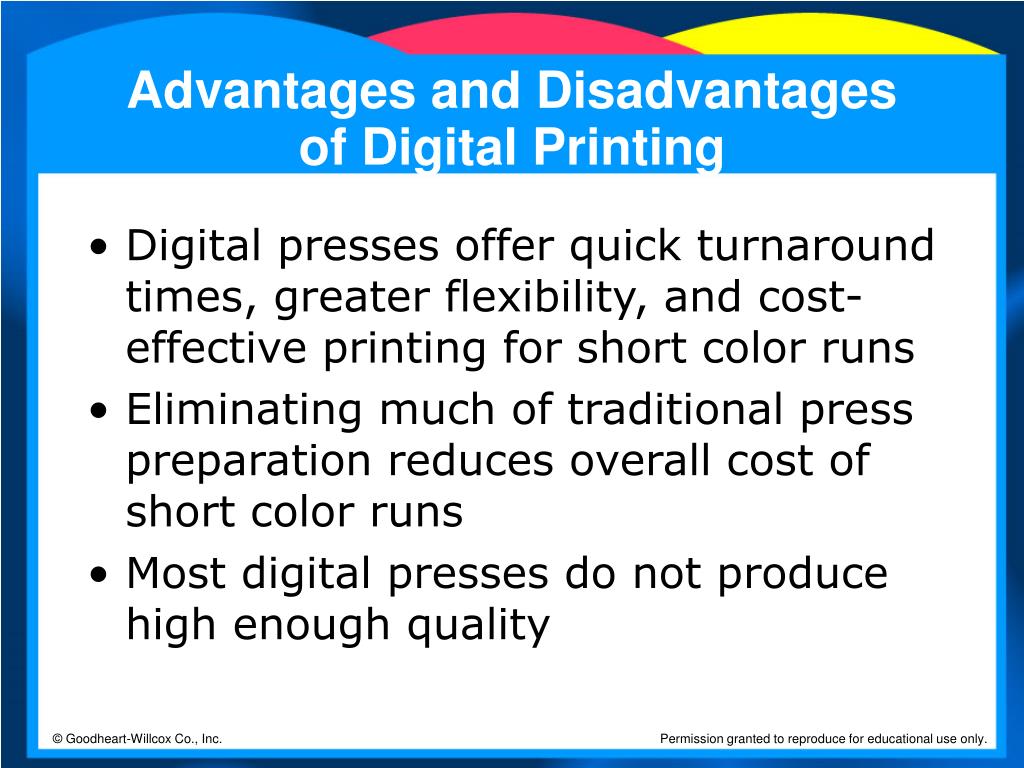Digital Printing Fundamentals Explained
Digital Printing Fundamentals Explained
Blog Article
The Ultimate Guide To Digital Printing
Table of ContentsDigital Printing Things To Know Before You Get ThisThe Best Guide To Digital PrintingThings about Digital Printing5 Easy Facts About Digital Printing ExplainedExcitement About Digital PrintingHow Digital Printing can Save You Time, Stress, and Money.
Variable data printing, such as direct mail with personalized codes and addresses, is ideally matched for digital printing. Digital quick printing just needs 4 steps of style, review, printing and binding to obtain every little thing done. Digital fast printing has an unequaled advantage: print on demand.According to PMMI, digital printing permits brands and makers to respond swiftly to client demands while boosting the supply chain, lowering warehousing expense and waste, and enjoying faster time to market. That all audios terrific, but exactly how does this innovation do all that? The major differentiator of these technologies is that there are no set-up charges and no plates with digital printing.
Rumored Buzz on Digital Printing
According to Wikipedia, the best difference in between digital printing and traditional methods such as lithography, flexography, gravure, or letterpress - Digital Printing is that there is no requirement to change printing plates in digital printing, whereas in these analog printing techniques the plates are consistently replaced. This causes quicker turnaround time and reduces cost when making use of digital printing.
Digital printing is very adaptable, so it's easy to make modifications to the plan design swiftly. It all goes back to the plates.
With standard printing methods, short-run printing is just not possible. Due to the fact that a great layout can make or break your item, digital printing continually creates top notch, clear and vivid graphics each time.
Digital printing is the process of printing digital-based images directly onto a selection of media substrates. There is no need for a printing plate, unlike with offset printing. Digital data such as PDFs or desktop posting documents can be sent directly to the electronic printing machine to publish theoretically, picture paper, canvas, textile, synthetics, cardstock and various other substratums.
The smart Trick of Digital Printing That Nobody is Talking About
According to PMMI, digital printing permits brands and makers to respond rapidly to customer needs while improving the supply chain, decreasing warehousing price and waste, and appreciating faster time to market. That all noises wonderful, however how does this technology do all that? The significant differentiator of these technologies is that there are no set up charges and no plates with electronic printing.
According to Wikipedia, the best difference between electronic printing and conventional approaches such as lithography, flexography, gravure, or letterpress is that there is no need to change printing plates in digital printing, whereas in these analog printing techniques home plates are continuously replaced. This results in quicker turnaround time and reduces cost when utilizing electronic printing.

The Only Guide for Digital Printing
Much more stock can indicate more waste in the future. With conventional printing methods, short-run printing is just not possible. Since a fantastic style can make or break your product, electronic printing consistently develops top notch, clear read more and vibrant graphics each time. Digital printing on flexible bags adds the bright, vibrant, and accurate graphics that virtually beckon try this out customers to reach out and touch them.

According to PMMI, electronic printing allows brand names and producers to react rapidly to customer needs while boosting the supply chain, minimizing warehousing expense and waste, and delighting in faster time to market. That all audios fantastic, but just how does this innovation do all that? The significant differentiator of these modern technologies is that there are no set-up costs and no plates with electronic printing.
Some Ideas on Digital Printing You Should Know
According to Wikipedia, the biggest distinction in between electronic printing and traditional techniques such as lithography, flexography, gravure, or letterpress is that there is no need to replace printing plates in digital printing, whereas in these analog printing techniques the plates are repeatedly replaced. This causes quicker turnaround time and lowers expense when making use of electronic printing.
Digital printing is very flexible, so it's easy to make adjustments to the package design rapidly. It all goes back to the plates.

10 Simple Techniques For Digital Printing
Digital printing is the procedure of printing digital-based images directly onto a selection of media substrates. directory There is no need for a printing plate, unlike with offset printing. Digital documents such as PDFs or desktop publishing files can be sent straight to the digital printing press to publish theoretically, photo paper, canvas, material, synthetics, cardstock and various other substrates.
Report this page